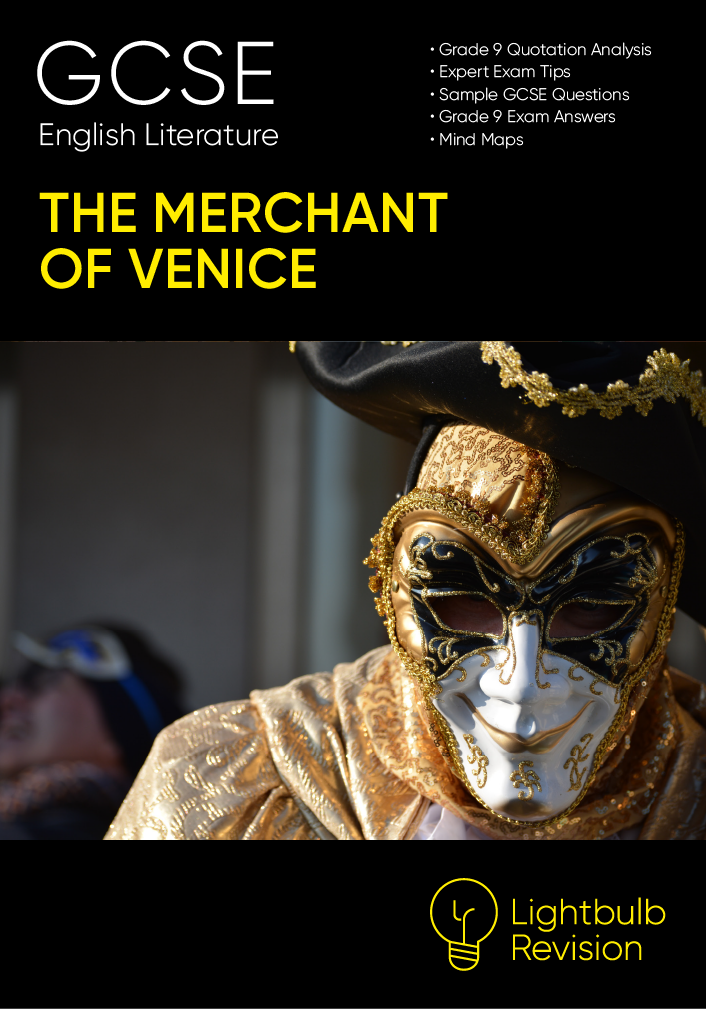Prejudice & Hate
Exploration of a theme
Prejudice is firmly rooted in all of the characters. Shakespeare explores how prejudice acts as a motivator and how it can generate deadly hatred.
‘I hate him for he is a Christian’
• Shylock states that he hates Antonio because of Antonio’s religion.
• The stark declarative statement leaves the audience in no doubt about the depth of Shylock’s hatred. The reason for this hatred is evident in the sentence construction; the conjunction ‘for’ links the two clauses together and shows how the hatred is inextricably linked to religion.
Context: Shakespeare’s audience would not have been familiar with Jews as Jews had been expelled from England in 1290. However, Christopher Marlowe’s play, ‘The Jew of Malta’, performed in 1592, also portrays a money-obsessed, revenge-seeking Jew named Barabas; Shakespeare’s portrayal of Shylock is similar to Marlowe’s and reinforced Elizabethan prejudiced perceptions of Jews.
‘You call me misbeliever, cut-throat dog/And spit upon my Jewish gaberdine’
• Shylock reminds Antonio about how he has been appallingly treated by him.
• Antonio has abused Shylock, calling him a ‘cut-throat dog’. By reducing Shylock to the status of an animal, the audience is aware that Shylock is dehumanised.
• Antonio has also physically abused Shylock by spitting on his cloak. This shows the complete contempt Antonio has for Shylock. The way that Shylock emphasises his ‘Jewish gaberdine’ shows that he believes he is being abused because of his race.
Context: Christianity was a cornerstone of society in Elizabethan England. Antonio’s lack of religious tolerance would not be as shocking for Shakespeare’s audience as it is for a modern audience.
‘most vilely in the afternoon, when he is drunk’
• Portia states that she dislikes the Duke of Saxony’s nephew when he is drunk.
• Portia refers to national stereotypes when she lists her suitors and here refers to the contemporary perception that the Germans were heavy drinkers. Prejudice is engrained in all of the characters.
Context: Laughing at national stereotypes was acceptable in Elizabethan England and Portia’s humorous dismissal of her multinational suitors would have been entertaining for Shakespeare’s audience.
‘He lends out money gratis and brings down/
The rate of usance here with us in Venice’
• Shylock states that one of the reasons for his hatred for Antonio is the way that Antonio lends money without interest, undermining his own business.
• Prejudice is seen as a cause for conflict and also drives the plot. There is resentment between Antonio and Shylock because of the financial regulations (see context).
Context: Venice’s laws were divisive as only Jews were allowed to charge interest on loaned money. Prejudice was cemented in the society through the unequal laws.
‘But though I am a daughter to his blood, I am not to his manners’
• Jessica rejects her father as she states that she might have been born Jewish but her personality is different to her father’s.
• There is hope here for love to transcend (overcome) prejudice as Jessica and Lorenzo fall in love despite the racial divide.
Context: Jewish descent is traced through the females in the Jewish family. For Jessica to marry outside her religion and convert to Christianity would have been a disaster for Shylock as it would mean the end of his bloodline.

Grade 9 Analysis
Look at the theme in a different way.
Does Shakespeare use the play to bolster (strengthen) or to challenge Jewish stereotypes?
Bolster:There seems little doubt that Shakespeare plays on contemporary stereotypes of Jews and so shows an innate prejudice. Shylock is resistant to integration as he is reluctant to dine with the Christians and he openly shows his horror as his daughter marries a Christian. More pertinently, in the courtroom scene, the audience graphically sees Shylock intent on bloody revenge sharpening his knife to slice Antonio open and refusing to back down. He repeatedly refuses to show mercy and mercy is portrayed as a Christian quality coming from God; Portia describes mercy as ’it droppeth as the gentle rain from heaven’. The contrast of this beautiful simile to Shylock’s obsessive, determined ’I will have my bond’ shows the audience that Jews are bloodthirsty and vicious and the Christians are the keepers of mercy and goodness.
Challenge: One of the most powerful lines from the play is Shylock’s passionate appeal to the Christians as he demands of Salerino ‘if you prick us, do we not bleed?’ The rhetorical question emphasises the humanity of the Jewish race. Shylock forces the characters, and the audience, to acknowledge that the Jews are not inhuman; they are people who behave in exactly the same way as the Christians. Perhaps one of Shakespeare’s purposes in writing the play was to show how religious intolerances are destructive and how it is humanity, not race or religion, which is important.




